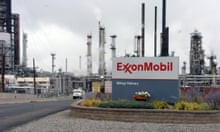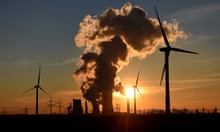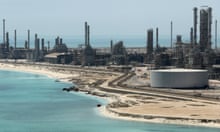World oil production will soar to new records over the next five years, as a dramatic expansion in demand from airlines offsets the arrival of electric cars, according to a report from Opec.
In a forecast that will dismay environmentalists – and which questions the theory that oil company reserves will become “stranded assets” – Opec’s annual report significantly revised production estimates upwards.
Most of the production increase will come from countries outside Opec, led by explosive growth from frackers in the United States, with China and India leading the increase in demand.
Opec expects global oil demand to reach nearly 112m barrels per day by 2040, driven by transportation and petrochemicals. That is up from almost 100m today and higher than last year’s projection.
Q&AWhat is Opec?
Show
Founded in 1960, the cartel of the world’s biggest oil producers emerged as a political and economic force with the 1973-74 US oil embargo, which caused oil prices to spike. The club consists of 13 countries, with Saudi Arabia the biggest producer, followed by Iraq and Iran.
In response to the 2014-16 oil price slump, Opec partnered with Russia in December 2016 to agree a cut in production of 1.8m barrels a day. That curb, the first of its kind in 15 years, drove up the price of oil. In May 2017, the cuts were extended until the end of March 2018.
Opec's official members are: Algeria, Angola, Ecuador, Equatorial Guinea, Gabon, Iran, Iraq, Kuwait, Libya, Nigeria, Republic of the Congo, Saudi Arabia, the United Arab Emirates and Venezuela. Indonesia and Qatar's membership has lapsed.
The Opec+ group, sometimes known as "Vienna Group", adds 10 non-member nations, including Kazakhstan, Mexico and Russia. Between them these nations supply 55% of oil production and hold 90% of the planet's oil reserves.
Coal will continue to be be burned in record amounts, despite concerns about its impact on climate change. Opec estimates that coal usage in the OECD countries will plummet by a third by 2040, but it will increase by 20% in developing countries to reach five times the volumes burned in the west.
The world’s airlines will be the single fastest growing user of oil, increasing consumption by 2.2% a year on average, to 2040. However, the largest absolute growth is expected to come from road transport.
The number of vehicles on roads across the world are expected to leap from 1.1bn now to around 2.4bn in 2040. In its central scenario, Opec expects just 320m of those to be electric, a number that climbs to 720m in a scenario where battery-powered cars take off rapidly.
It said that if the higher prediction for electric cars came to pass, oil demand would only slip slightly to 109m bpd rather than 111.7m bpd by 2040, the report said.
Opec revised downwards its forecast for the market share of diesel vehicles because of the fallout from the dieselgate scandal and electric strategy announcements by carmakers over the past year.
Renewable energy production will rise rapidly but even by 2040 will meet only around 20% of global energy demand by 2040, according to projections in the report.
The price of crude oil has jumped from about $50 (£38.29) a barrel in late 2016 to highs of $80 this summer, partly due to the cartel’s agreement with Russia to cut production for 18 months.
Although the Opec report shies away from making price predictions, motorists are unlikely to see much in the way of relief on the forecourts. Earlier this month, the International Energy Agency warned there was a risk of oil prices spiralling higher in the coming months, posing a dilemma for the chancellor, Philip Hammond, as he looks to raise fuel duty.
Most oil companies expect peak oil demand will occur in the 2030s, while more bullish predictions say it could come in the 2020s as climate change regulations bite.
Opec, which was meeting in Algiers on Sunday to discuss how to share out an increase in output to bring down prices, sees the US as soaking up most of the growth in production over the next 10 years.
“US tight oil is projected to grow very strongly in the period 2018–20, albeit slowing a bit thereafter, and to peak … in the latter half of the 2020s,” the World Oil Outlook report said.
While the group admits the US will beat it in the short run, it believes an American peak in the late 2020s will mean Opec remains relevant in the long run. It hopes to increase its share of world oil supply from 34% now to 40% in 2040.
The report doubts whether the pro-fossil fuel regulatory pushes by the US president, Donald Trump, will help the US oil industry, citing the fact that production soared under the “overly burdensome” regulatory environment it faced under Barack Obama’s presidency.







